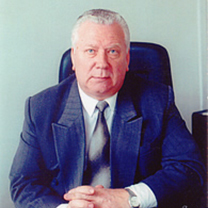The 9th Award Profile of the Recipient

Name and age
Dr. Mykola Tronko (68 years old)

Name and age
Dr. Mykola Tronko (68 years old)
● Academic Background
・09.1961-06.1967 - Kyiv Medical Institute, Physician
・09.1967-09.1970 - Postgraduate studies, Research Institute of Endocrinology and Metabolism, Kyiv
・11.1971 - Academic degree of Candidate of Medical Sciences (Specialty: Endocrinology)
・04.1981 - Deputy Director of the Research Institute of Endocrinology and Metabolism, Kyiv
・07.1984 - Academic degree of Doctor of Medical Sciences (Specialty: Endocrinology)Ky
・03.1986 - till now – Director of the State Institution “V.P. Komisarenko Institute of Endocrinology and Metabolism, Natl.
Acad. Med. Sci. Ukraine”, Kyiv
・12.1989 - Professor
・11.1992 - Corresponding Member of the Academy of Sciences of Ukraine(Specialty: Radiation Medicine)
・04.1993 - Corresponding Member of the Academy of Medical Sciences of Ukraine(Specialty: Endocrinology)
・09.2010 - Academician of the National Academy of Medical Sciences of Ukraine(Specialty: Radiation Endocrinology)
● Major accomplishments
・04.1986 Organization of endocrinological examinations and treatment for children having been evacuated from the
most affected regions following the Chernobyl accident
・01.1989 Organization of surgical treatment of children and adolescents victims of the Chernobyl accident, suffering
from thyroid pathology, especially thyroid cancer
・01.1991 Organization of introduction of fine-needle aspiration biopsy into the process of preoperative diagnostic of
thyroid pathology in affected subjects
・02.1991 Organization of establishment and management of a clinico-morphological Registry of thyroid cancer in
children and adolescents of Ukraine, affected as a result of the Chernobyl accident
・01.1995 Creation of a specialized Department of Endocrine Radiology for free postoperative treatment with
radioactive iodine to children and adolescents affected as a result of the Chernobyl accident
・10.1998 Establishment of the Ukrainian part of the International Chernobyl Bank of thyroid tissues and nucleic acids
・11.1998 Organization of screening examinations to affected subjects from the more highly contaminated regions of
Ukraine, in the framework of a Ukraine-U.S.A. Thyroid Project
・01.2011 Organization of molecular-epidemiological studies of thyroid cancer in children and adolescents of Ukraine
affected as a result of the Chernobyl accident in cooperation with Nagasaki University
● Reasons for selection
Professor Mykola Tronko was appointed director of the State Institution V. P. Komisarenko Institute of Endocrinology and Metabolism, National Academy of Medical Sciences of Ukraine, one month before the Chernobyl accident, in March 1986.
Since his appointment he has been consistently involved in investigating the effects of the accident on the thyroids of the inhabitants of the area, and conducting medical examinations. In 1995 he reported the increasing number of cases of pediatric thyroid cancer in Ukraine in Nature magazine, earning attention from around the world.
Following his pursuit of international joint research efforts he was also the first person in the world to report the high frequency of RET proto-oncogene rearrangements in the dramatically rising incidence of thyroid cancers resulting from the Chernobyl accident, in addition to which he had led epidemiological and molecular biological research into radiation-induced thyroid cancer.
Moreover, he has enthusiastically participated in numerous international projects over the space of many years, and his Institute manages radiation-induced thyroid cancer biospecimens as Ukraine’s representative body in the Chernobyl Tissue Bank (CTB) of the World Health Organization (WHO).
Professor Tronko has for a long time promoted joint research with Nagasaki University, and been involved in the pursuit of joint research into radiation-induced thyroid cancer ever since visiting Nagasaki in November 1991 as a member of the Ministry of Foreign Affairs’ Expert Council on Chernobyl. He was involved in the conclusion of an academic agreement exchange between his Institute and Nagasaki University in 2003, and has devoted his energies to further joint research and interaction between personnel.
